How The Autonomous Tractor Can Help Drive Sustainable Agriculture Practices
Ever since the onset of globalization, people have been asking: “how will agriculture feed the world?”. According to the United Nations, the current global population of 7.6 billion will grow to 8.6 billion by 2030. This presents a straightforward challenge to farmers and the agriculture industry: Crop production will need to double to feed the world.
Ramping up production will require more than executing old methods faster. The agricultural sector must adopt new tools and technologies to make growers more productive and efficient. As outlined by the National Academy of Sciences, “agriculture is undergoing a fourth revolution triggered by the exponentially increasing use of information and communication technology (ICT).” Embracing all ag-related emerging technologies is central to embedding sustainable agriculture practices worldwide.
Here at Bear Flag, we are pioneering a key form of sustainable tech: the autonomous tractor. Our tractors combine automation and robotic technologies to combat many of the barriers to sustainability. Read on to know more about sustainable agriculture, and how autonomous tractors can help.
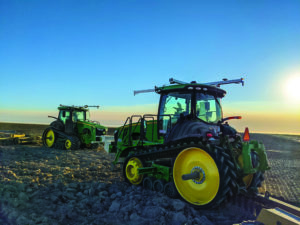
What Is Sustainable Agriculture?
Carried out in certain ways, agriculture can place a strain on natural resources and the environment. Sustainable agriculture practices aim to safeguard the environment, expand the planet’s natural resources, and preserve and improve soil quality. Researchers in sustainable agriculture frequently work across disciplines, combining biology, economics, engineering, chemistry, social inclusion, and many more.
Sustainable agriculture practices also aim to raise farm income, encourage ecological sustainability, and improve farm community and social quality of life. Perhaps above all, an integrated system of production practices is intended to provide enough food to meet the needs of a rapidly growing population. A variety of practices are used by experts in the sustainable agricultural sector. Growers use modern techniques and technology to improve soil health, reduce water consumption, or optimize farming operations.
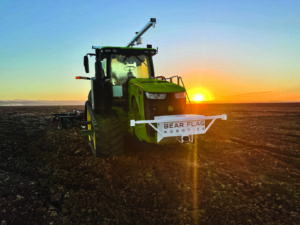
The Role Of Autonomous Tractors In Sustainable Agriculture
John Deere, Bear Flag’s parent company, is deeply committed to sustainability. As per the most recent John Deere Sustainability Report, 28 million pounds of material are recycled through remanufacturing in John Deere settings. Deere is also committed to the use of renewable energy: there has been a 19% reduction in greenhouse gas emissions since 2017; 32% of global electricity has been sourced from renewables; and 78 percent of waste has been recycled.
Deere intends to further reduce their environmental impact in the coming years. They will increase the use of sustainable materials by boosting remanufactured and rebuilt sales by 30%, and by increasing recyclable, renewable, and recycled content by 10%.
As part of the Deere family, we are excited to pursue our own sustainability goals. By applying our unique smart farming technology, we are striving to mirror Deere’s successes. What is the main goal of sustainable agriculture in relation to autonomous tractors? There are three key goals: Drive efficient energy usage, better resource management, and reduced emissions.
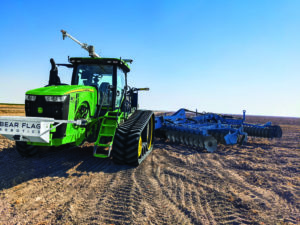
More Efficient Energy Usage
Errors of this kind can lead to inefficient energy usage. (Even a slightly erroneous path can lead to big inefficiencies when iterated day after day.) Autonomous tractors can correct these shortcomings. By relying on precise and automated route-planning – driven by high-quality data – autonomous tractors can be configured so that no wasteful maneuvers or paths occur.
And as they collect more and more data, autonomous tractors become more and more precise. This enables them to continually unlock new efficiencies and fully economize their fuel usage.
Better Water Management
Agriculture irrigation uses 70% of water globally. High water usage risks depleting aquifers, creating negative environmental externalities.
Via their use of sensor technologies and other data collection techniques, autonomous tractors can improve water management. They continuously collect a wealth of data from the environment, and parts of this data can be used to refine a farm’s approach to irrigation.
Redundant and precision sensors, LIDARs, GPS and tractor-mounted cameras enable farmers to acquire a fuller picture of their fields. With this perspective, they can optimize their approach to soil tilling, seed planting, and more – all of which ties to better water management.
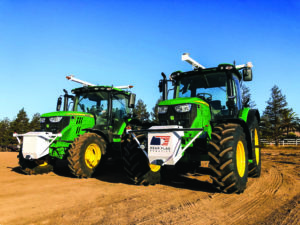
Reduced Emissions
Anthropogenic greenhouse gas emissions from agricultural operations account for 10 % to 14% of worldwide GHG emissions. Emissions on a farm are unavoidable; however, the autonomous tractor can help drive a reduction in these emissions. As a form of precision farming for sustainable agriculture, autonomous tractors optimize operations so that fuel consumption is minimized, which translates into decreased emissions.
When tractors are more precise during their operation, every yard they cover is productive. This means less diesel is wasted on unnecessary ground. Because they can economize their fuel usage, autonomous tractors are able to cut emissions to the very minimum required for operations.
Farming with autonomous tractors enables farmers to produce more crops at a lower cost, with fewer resources, and larger profit margins – all while cutting GHG emissions.
Spearheading Sustainability With Autonomous Tractors
Feeding a growing human population is one of the biggest challenges facing the modern world. Increasing agricultural production efficiency is critical – however, upping production without upping environmental impact is key.
Creating a future where sustainable agriculture is the norm will involve many factors. However, the tools we use have a key role to play. Here at Bear Flag, we are proud that our autonomous tractors are able to drive more efficient energy usage, reduced waste, and lower emissions.
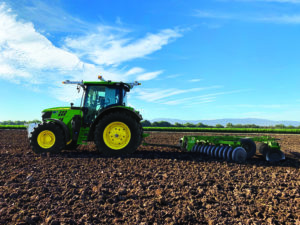
Subscribe to the Bear Flag newsletter to receive regular updates and news about autonomous tractor technology and more sustainable agriculture practices.